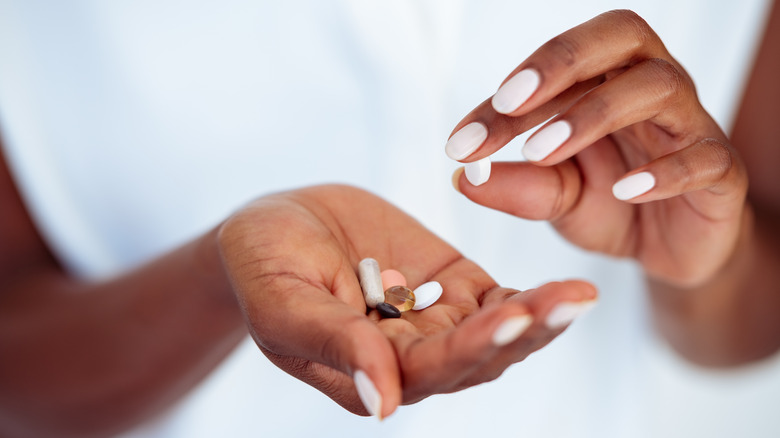Does Biotin Actually Help Your Hair Grow?
Whether you're struggling with hair loss or have thin strands, it's not uncommon to look for ways you can help your hair grow. Genetics play a large role in what your hair looks like and are often the reason behind hair loss or hair that doesn't seem to grow (via Everyday Health). "There are multiple different genes related to hair loss, and this is a very complex interplay of many genes," said Alison Bruce, MBChB, a dermatologist at Mayo Clinic. "You shouldn't assume you've done anything to cause your hair loss, especially if you are otherwise healthy."
However, hair loss and brittle hair can also be caused by vitamin deficiencies. Many vitamins are essential for healthy hair, including biotin (via WebMD). Also known as vitamin B7, biotin helps the body form fatty acids and glucose and helps it turn food into energy (via Healthline). Not getting enough biotin can lead to various health issues including dry and brittle hair. That being said, biotin deficiencies are rare and there is little evidence to suggest that biotin supplements do much for your locks if you don't have a deficiency. You probably won't experience any health issues if you take biotin supplements occasionally, but they probably won't provide any benefits either.
Side effects of biotin supplements
Although biotin is generally safe to take, there are some potential side effects you should know about. Some people may experience breakouts on their faces after they begin taking this supplement. "While not everyone who takes biotin will experience acne, there are some anecdotal reports of people noticing increased acne after taking biotin," dermatologist Marisa Garshick, MD, told Popsugar. This happens because too much biotin in the body can lead to an imbalance of pantothenic acid in the body, which is needed to fight acne. Biotin can also lead to skin rashes and digestive issues like nausea, gas, and bloating (via Bustle).
All supplements, including biotin, should be consumed with caution. The supplement industry is not regulated by the FDA, which means that companies do not have to be entirely transparent about what their products contain (via HuffPost). "Supplements, in general, are kind of an unregulated market. A lot of supplements are not FDA approved so we don't get a lot of research on them," said Michelle Henry, clinical instructor at Weill Cornell Medical College. It's always a good idea to talk to your doctor before taking any new vitamins or supplements.


